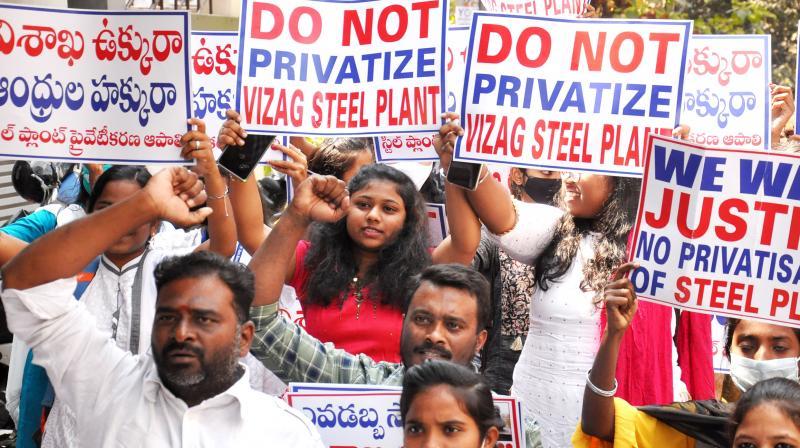Unions Determined to Continue Opposing Vizag Steel Plant Privatisation

Image Courtesy: Deccan Chronicle
Kolkata: Trade unionists protesting the Narendra Modi government’s decision to privatise the Rashtriya Ispat Nigam Limited (RINL), better known as the Visakhapatnam Steel Plant (VSP), for the last 15 months are determined to continue the agitation until the 100% disinvestment plan is scrapped.
On January 27, 2021, the Cabinet Committee on Economic Affairs had given in-principle approval to 100% strategic disinvestment of the government’s shareholding in the public sector unit, whose foundation was laid by then-Prime Minister Indira Gandhi on April 17, 1970, after a massive agitation in undivided Andhra Pradesh in the 1960s in which 32 agitators were shot dead by the police.
The primary reason cited by the Centre for privatisation of the plant was the huge loss incurred over the years. Tuhin Kanta Pandey, secretary, department of investment and public asset management, had said that 100% privatisation of the plant with the transfer of management control was crucial for meeting the disinvestment target of Rs 1.75 lakh crore.
Trade union representatives told Newsclick that the people of Andhra are determined to continue the agitation against privatisation. The near-term aim is to involve more people in our struggle by enlisting greater cooperation of political parties.
Taking note of the anti-privatisation sentiments in the state, the Rashtriya Swayamsevak Sangh-backed Bharatiya Mazdoor Sangh has joined hands with CITU, AITUC and INTUC. Chief minister (CM) Jagan Mohan Reddy and his party YSR Congress and his predecessor N Chandrababu Naidu and his party Telugu Desam have taken up the matter with Prime Minister Narendra Modi.
Veteran bureaucrat EAS Sarma, who had held important positions in the state government and in the Union power and finance ministries, has urged Reddy to actively oppose New Delhi’s decision.
The refusal of Union finance minister Nirmala Sitharaman to reconsider the decision no doubt acted as a dampener but also made the trade unions more determined in their struggle against the VSP’s privatisation, Ch. Narsinga Rao of CITU, Mantri Rajsekhar of INTUC and JVS Murthy of AITUC told Newsclick.
“Should circumstances warrant, we will go for an indefinite strike. We will not allow officers entrusted with privatisation—be they valuers and legal or technical experts—to enter the Vizag Steel Plant premises. This is our resolve. In the 1960s, our slogan was Visakha Ukku Andhrula Hakku (Visakhapatnam Steel Plant is the right of Andhraites).
Andhraites are ready for any sacrifice,” the three leaders said.
According to the trade union leaders, the loss factor cited by the government as the reason for privatising the plant is “being blown out of proportion”. They admitted that the VSP has incurred losses for several years and has a debt of Rs 22,000 crore “but it is also a fact that RINL registered net profit for several years at a stretch”.
“The plant’s capacity increased from 6.3 million tonnes (MT) to 7.3 MT because of the positive stance of previous Central governments and the company closed 2021-22 with a profit of more than Rs 800 crore,” the leaders added.
The leaders alleged that the Modi government is “allergic to PSUs and ignores that a majority of the PSUs are earning profit and contributing regularly to the exchequer”.
According to the leaders, Sitharaman is “silent on the large haircut being suffered by public sector banks” in a large number of National Company Law Tribunal (NCLT) cases. The haircut thrust upon them ranges between 50% and 80% of the loans advanced by banks to NCLT companies—all in the private sector. In recent months, for an NCLT-listed textile outfit acquired by a Mumbai-based corporate giant, the lender had to accept a haircut of 85%, sources told Newsclick.
For the construction of the country’s first shore-based integrated steel facility, about 20,000 people from 68 villages gave up their land and houses. With more than 30,000 direct and contractual employees, including around 4,500 SCs and STs, about a lakh people are dependent on it for their existence.
One major disadvantage for RINL is that lacks captive iron ore mines while other companies are assured of 60%-70% per cent of their iron ore requirement from captive sources—it is not a level playing field for RINL cost-wise.
Reddy’s February 6 and March 9, 2021, letters addressed to the Centre pointed out the cost disadvantage resulting from iron ore purchase at a market price of Rs 5,260 per tonne.
Citing these figures, Rao, Rajsekhar and Murthy pointed out that RINL is required to service its debt at a high interest of 14%. “The steel industry has its highs and lows depending upon demand and supply and annual reports of integrated steel companies will establish that in the years RINL had to put up with loss, its rivals did not perform as well. In the case of RINL, time and cost overruns no doubt contributed to its financial woes in the initial years. The state’s repeated requests to the Centre to allot RINL a captive iron ore mine in Odisha have fallen on deaf ears.”
According to a report in The Hindu on April 19, for reasons not officially explained, the Centre has cancelled a coking coal mine lease in Rabodh, Jharkhand, meant to be a captive source for RINL.
“If the costly financial restructuring of so many sick, mismanaged private sector companies is being undertaken under the aegis of NCLT, why can’t the Narendra Modi government undertake a recast of the finances of RINL by converting loans into equity and allot the same to the lenders?” Rao, Rajsekhar and Murthy, who are part of an umbrella organisation called Visakha Ukku Parirakshsana Porata Committee, asked.
According to the leaders, the “positives far outweigh the negatives” in RINL’s case”. “The revival process won’t be a long-drawn-out affair. When revived, RINL can be directed to go for an IPO, giving an opportunity to its lenders to sell the equity they get under the loan conversion exercise,” the leaders argued and pointed out that “given the land available, RINL can undertake further capacity expansion up to 20 MT in terms of liquid steel”.
It remains to be seen whether Telangana CM K Chandrasekhar Rao will also join the agitation against VSP’s privatisation decision. Rao has already resolved to expand the Telangana Rashtra Samithi’s (TRS) footprint. There are indications that he may field some TRS candidates in the next Andhra Assembly elections.
A gazette notification dated March 1, 2014, on the Andhra Pradesh Reorganisation Act, 2014, provides in the concluding portion under the heading ‘Infrastructure’: “SAIL shall examine, within six months from the appointed day, the feasibility of establishing an integrated steel plant in Khamam district of successor state Telangana.” To this day, that remains an intention on paper.
Get the latest reports & analysis with people's perspective on Protests, movements & deep analytical videos, discussions of the current affairs in your Telegram app. Subscribe to NewsClick's Telegram channel & get Real-Time updates on stories, as they get published on our website.























